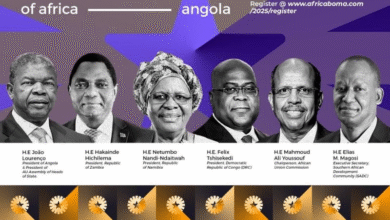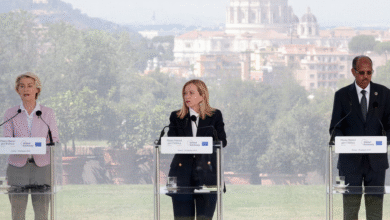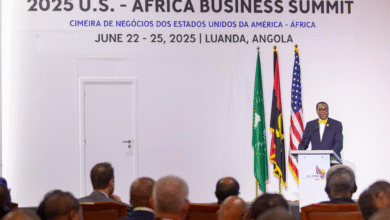Thanks to their economic and important strategic potential, Morocco and Nigeria could in the very near future, boost their trade . The two « lions of Africa » might well bring synergies in the fields of industry, but also in as agriculture, finance, energy, infrastructure …
According to the website of the Moroccan economic information Media 24, Morocco’s Minister for Foreign Affairs, Nasser Bourita traveled to Nigeria to meet the President Muhammadu Buhari in Abuja, with the prospect of installing a fertilizer products factory through the Moroccan phosphate producer OCP. Thus, Morocco and Nigeria demonstrate their common ambition to act on food safety. These two countries, models of development have inspired the subject of a seminar which took place July 19, 2016 in Lagos, « Morocco, Nigeria, Bridging the Synergies », organized by ‘Economie Enterprise’, a Moroccan media in partnership with the Nigerian « think thank » , Center for Public Policy Alternatives. It aims to bring economic thinking between Morocco and Nigeria. It brought together more than 150 personalities from the public and private sectors, policy makers, researchers, economists including Olusegun Obasanjo, former President of Nigeria and Obiageli Ezekwesili, former Minister of Education of Nigeria.
A perspective of South-South partnership
currently passing through an economic and financial crisis unprecedented, Nigeria might focus on its relations with Morocco in order to get out of this situation. The latest figures reported by the Nigerian Bureau of Statistics show an increase in inflation to 16.5% at the end of June, against 15.3% in May. This is the highest level since October 2005. The two largest economies are also two great actors that could successfully achieve a South-South partnership. Note that trade between the two economic giants have not been consistent. « Morocco and Nigeria are two countries with many strengths and complementarities that have been insufficiently evaluated to date and are therefore significantly underutilized. Maybe the language barrier has prompted the Moroccan government and businessmen to focus instead on Francophone Africa where Morocco is well positioned in many sectors including banking, insurance and services. Thus, trade between Morocco and Nigeria are very limited and Nigeria only contributes only 0.6% of Moroccan exports and 0.1% of its imports. These exports focus on two products: fertilizers and fish products. As for imports, it is mainly natural gas, animal feed, coffee and cocoa. That said, the foundation for good cooperation are in place and in this regard, I note that the Royal Air Morocco provides almost daily service between Casablanca and Lagos and acts as a strategic bridge between the two countries and with other continents.
We notice however that important niches are still underutilized including in the field of tourism where Morocco could capture a relatively adventurous Nigerian customers and in many areas where there is a win-win potential, « says Marie Françoise Marie-Nelly, Director of the of the World Bank’s departments of Maghreb, Malta, Middle East and North Africa
Significant economic benefits
Morocco and Nigeria are two countries classified in category of countries with middle income by the World Bank. « … This means that our added value is more related to our intellectual contribution than to our financial support. In both countries, the World Bank brings its expertise in various areas related to development. It provides analysis and technical studies on the context of the preparation and review of public policies and contributes to the knowledge sharing between countries. For example, both countries have plans to diversify and improve their agricultural productivity and can learn a lot from each other. Being present in this sector in both countries, the Bank can play a catalytic role in these exchanges. Similarly, Morocco has been a forerunner in the development of a strategy to mitigate the effects of climate change and has set out an ambitious program to improve its energy mix with a target of 42% of renewable energy by 2020 and 52 % by 2030. in this context, the country developed a production capacity of concentrated solar power with the support of the World Bank and other financial partners. This localized experience in Ouarzazate is well advanced with a first part of 180MW already operational for several months. Nigeria could learn from this experience, as its northern part has all the requirements to develop solar energy in favorable conditions and thus diversify its energy mix. The World Bank’ involvement in the two countries can also promote these exchanges, « says Marie Françoise Marie-Nelly. Thus, strengthening its economic relations with Morocco, the largest economy in Africa which suffers from oil crisis, could enable to develop Nigeria’s economic growth.
By Darine Habchi







